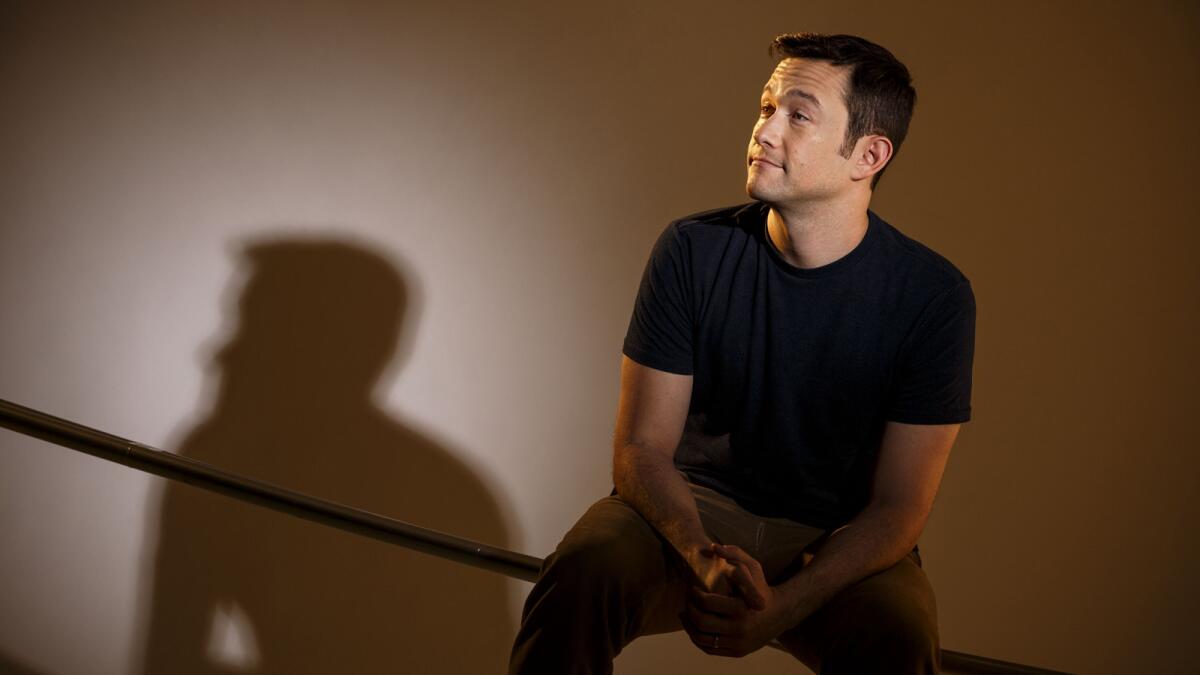Joseph Gordon-Levitt mentored by daredevil Philippe Petit for ‘The Walk’

Joseph Gordon Levitt in the Los Angeles Times studio on Aug. 12, 2015.
- Share via
Talk to Joseph Gordon-Levitt about Philippe Petit, the French daredevil who walked a high wire between the World Trade Center towers in 1974, and the conversation will wind its way through Paris (the actor’s favorite city) and its cinema culture, the connection between wire walking and acting (“both are games of focus”) and what it takes, beyond athleticism, for a human being to step out on a metal cable, 110 stories in the air, carrying a 60-pound pole without a safety net or harness.
“A lot of it comes down to ...” — and here the 34-year-old Gordon-Levitt, seated on a couch in the Glendale office of his online production company, hitRECord, pauses, a look of mischief crossing his face — “... optimism.”
Gordon-Levitt plays Petit in “The Walk” (Sept. 30), the Robert Zemeckis-directed feature film chronicling the aerialist’s early life and the meticulous planning and law-bending that went into his famous 45-minute dance in the lower Manhattan sky. The elfin Petit’s exploits had been related before in James Marsh’s 2008 Oscar-winning documentary “Man on Wire,” which used interviews and pictures to reconstruct the stunt.
SIGN UP for the free Indie Focus movies newsletter >>
Zemeckis, employing visual effects and 3-D filmmaking, puts you on the cable with Petit and re-creates with striking detail the then-recently opened twin towers. The difference between the movies is, as Gordon-Levitt puts it, as distinct as the gulf between Jimi Hendrix’s howling version of “All Along the Watchtower” and Bob Dylan’s relaxed original.
Zemeckis says he first came across Petit’s story through Mordicai Gerstein’s 2003 children’s book, “The Man Who Walked Between the Towers.” Gerstein’s cover illustration shows Petit’s right foot suspended on a wire and a sea gull and New York City below it. “When I saw that,” Zemeckis says, “I knew that was a story that needed to be told in 3-D.”
Selling Gordon-Levitt on the project wasn’t hard even though the actor had a pronounced bias against 3-D filmmaking (“unnecessary at best, distracting at worst,” he says) shared with friend and collaborator filmmaker Christopher Nolan. Zemeckis, though, had been honing the technology through earlier motion-capture movies including “The Polar Express,” “Beowulf” and “A Christmas Carol.” In “The Walk,” he had a project in which 3-D, done from the outset, could serve and heighten the story through a dramatic use of space and depth.
The wiry Gordon-Levitt has displayed a physical grace before in film, and Zemeckis points to his showmanship when hosting various hitRECord live events as a reason why he thought of him as a candidate to play the showboating Petit. But it’s one thing to dance around downtown Los Angeles to Hall & Oates, as Gordon-Levitt memorably did in “(500) Days of Summer,” and another to walk a studio high wire, even one that’s just 12 feet — rather than a quarter-mile — off the ground.
To learn the ropes (and cables), Gordon-Levitt met with Petit, who lives in upstate New York and still takes a daily walk on the same wire he used at the World Trade Center. Petit planned an elaborate, eight-day workshop, each lesson broken down into 10-minute blocks (everything from juggling to how to put on shoes — which would be standing, never sitting). Gordon-Levitt honed his French accent by listening to Petit (“he has a unique way of speaking”), learned about engaging his core and arm muscles to stay tight while walking and discovered why Petit would recline during a performance (theater, yes, but also because that pole gets heavy).
“It became easy for me,” the actor says. “I could walk forward and backward on a wire that was 2 feet off the ground. No problem. But when the wire was moved up to 12 feet, no matter how much I told myself this is all fine, my body just seized up. As soon as you start thinking that you’re really high up, you start shaking. And then, you’re sunk.”
Gordon-Levitt, who will be seen this year starring in Oliver Stone’s “Snowden,” about the former National Security Agency contractor (“It’s like ‘Born on the Fourth of July,’ very much the story of his life,”), and opposite Seth Rogen in the Christmas comedy “The Night Before” (“the easiest job I’ve ever done”), notes that Petit’s feat carries an obvious poignancy in the wake of Sept. 11. Several scenes in “The Walk” take place in a physically re-created World Trade Center lobby. Stepping onto that set, Gordon-Levitt says, affected everyone.
“Of course, when any of us think of the World Trade Center, we think of the tragedy immediately,” he says. “That will always be where our minds go first. And I don’t think that’s a bad thing. It’s important to remember that tragedy. But with any tragedy, it’s also remembering the good times, the beautiful moments, the warm feelings you have toward whatever it is that you’ve lost.”
“I’ve experienced one particular tragedy in my life — my brother died,” he adds. “And it’s important not to think just about how he died. It’s important to also remember his life and all the things that I love about him. And I think this movie does that sort of remembering too. I hope so, anyway.”
MORE:
FULL COVERAGE: Fall Movie Guide
Heady days for Jessica Chastain
Filmmakers tackling social issues keep it real but also entertaining
More to Read
Only good movies
Get the Indie Focus newsletter, Mark Olsen's weekly guide to the world of cinema.
You may occasionally receive promotional content from the Los Angeles Times.











